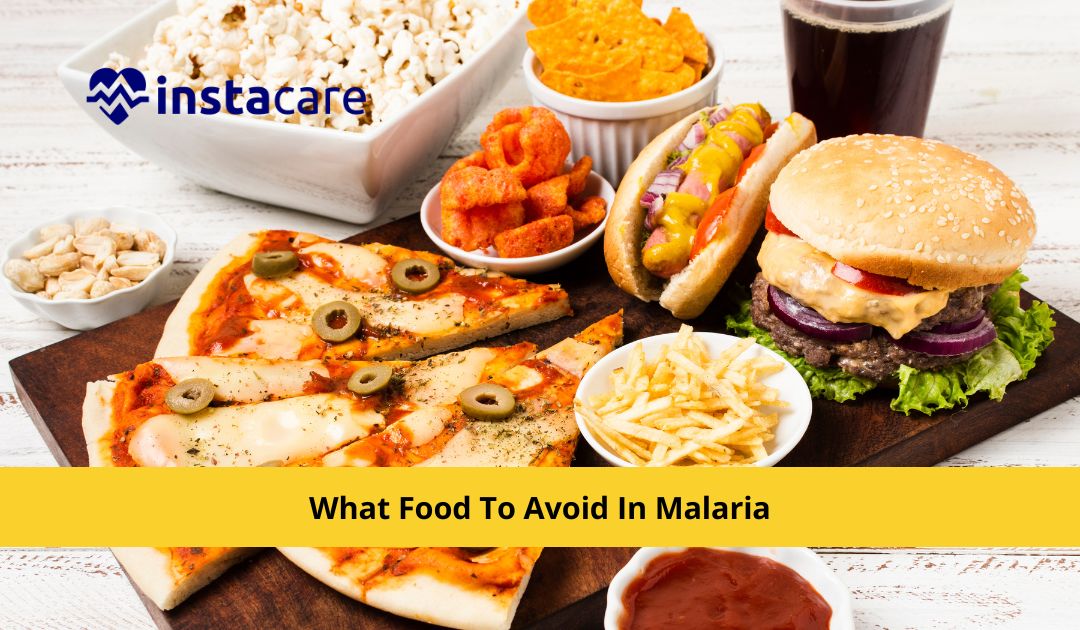Malaria is a common illness carried by mosquitoes. Thus
impacting millions of individuals globally. These symptoms include fever,
chills, tiredness, and in severe and bad cases potentially life-threatening
complications. Even though receiving medical attention is essential. How you handle your illness and speed up your recovery depends
largely on what you eat.
Understanding the malaria infection and its implications on
one's health is fundamental to navigating through the dietary dos and don'ts
during this period. It's important to realize that while certain foods can
bolster recovery, others might exacerbate symptoms or hinder the healing
process.
Foods To Avoid During Malaria
When combating malaria, it's crucial to steer clear of
certain foods. That can potentially worsen symptoms or hinder recovery.
Avoidance of foods like sugary treats and beverages, high-fat or fried items,
alcohol, and excessively spicy foods. Certain dairy products are recommended. These
food categories have the potential to exacerbate malaria symptoms. Or
negatively interact with medications, impeding the healing process. Opting for
a balanced diet rich in nutrients. Excluding these problematic food groups can
significantly contribute to a smoother recovery from malaria.
1- Impact Of Sugary Foods And Beverages
Eating too much sugary stuff when you have malaria can mess
up your blood sugar levels. And make it harder for your body to fight off the
sickness. Malaria often makes you feel weak and tired, and eating lots of sugar
can make these symptoms worse. Also, sugary foods might make your malaria
medicine work less well. If you want to keep your energy up without making it
tougher to get better, go for healthier choices like fruits or snacks with less
sugar.
2- Avoidance Of Fatty And Fried Foods
High-fat and fried foods pose challenges to individuals
recovering from malaria. These types of food can be tougher for the body to
digest, possibly leading to discomfort or stomach problems. This can divert the
body's attention away from fighting the infection. Additionally, these foods
might cause inflammation. Which can weaken the immune system's ability to
respond. It's vital to swap these foods for healthier options
packed. With vital nutrients like lean proteins, whole grains, and vegetables.
These substitutes ensure a balance of nutrients without imposing additional
strain on the body. During the recovery phase of malaria.
3- Alcohol And Its Effects On Malaria
The consumption of alcohol during malaria can impede the
body's ability to recover effectively. Alcohol can interfere with medications
prescribed for malaria, reducing their efficacy. Additionally, it can dehydrate
the body. Leading to an exacerbation of symptoms like fatigue and weakness.
Which are already common during the illness. Furthermore, alcohol consumption
may suppress the immune system. Thus prolonging the recovery process. It is
highly recommended to abstain from alcohol consumption entirely while battling
malaria to support the body's healing mechanisms and promote a faster recovery.
4- The Role Of Dairy Products
Understanding how dairy affects individuals with malaria is
crucial. Some dairy products might exacerbate symptoms or lead to digestive
discomfort during the illness. Therefore, exploring suitable alternatives rich
in calcium and other essential nutrients becomes imperative. Options like
fortified plant-based milk, leafy greens, nuts, and seeds can offer similar
nutrients without adverse effects, ensuring individuals receive vital nutrients
without compromising their recovery.
5- Caffeinated Drinks And Their Influence
When you're sick, especially with malaria. It's important to
know how caffeine affects you. Caffeine is found in coffee, tea, and some
sodas. Can dry you out by making you pee more, making tiredness and headaches
worse. Try other drinks like herbal teas, flavored water, or drinks with
electrolytes. These can help keep you hydrated without the drying effect of
caffeine. This can make your recovery easier.
6- Spicy Foods And Malaria
Evaluating the impact of spicy foods on individuals with
malaria is essential in crafting a suitable diet. Spicy foods might exacerbate
gastrointestinal discomfort or irritation, common symptoms during malaria.
Opting for a bland yet nutritious diet comprising easily digestible foods like
boiled vegetables, rice, and lean proteins ensures adequate nutrition without
further aggravating symptoms, facilitating a gentler recovery.
The Importance Of Hydration
Highlighting the significance of proper hydration during
malaria cannot be overstated. Adequate hydration supports the body's functions,
aids in the elimination of toxins, and helps regulate body temperature. Optimal
fluids to consume include water, coconut water, and clear broths to maintain
hydration levels, crucial for a swift recovery and alleviating symptoms like
fever and fatigue.
Herbal Remedies And Their Usefulness
Understanding the potential benefits and risks of herbal
supplements during malaria is crucial. While some herbal remedies might aid in
managing symptoms, their efficacy and safety vary. Seeking expert advice and
using caution before incorporating any herbal supplements is advisable to
ensure they complement medical treatments without causing adverse effects.
Food Safety And Preparation
Ensuring strict food safety and hygiene practices while
preparing meals becomes imperative to prevent additional health complications.
Proper washing of fruits and vegetables, cooking foods thoroughly, and
maintaining clean kitchen practices help prevent infections or complications
that can exacerbate the effects of malaria.
Conclusion
Navigating the dietary landscape during malaria can significantly impact one's recovery. By avoiding specific foods and adopting a nutritionally balanced diet, individuals can support their immune systems and aid the healing process.

